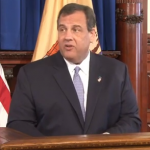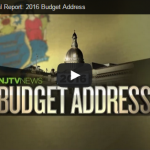Governor Chris Christie’s FY 2015 Budget Address As Prepared For Delivery
Lt. Governor Guadagno, Speaker Prieto, President Sweeney, members of the Legislature, fellow New Jerseyans:
I am pleased to present to you my Budget for Fiscal Year 2015.
This is the fifth time I have come before this Legislature to deliver a budget message.
It is one of the most important obligations of any governor.
Today, I present to you a budget that is balanced, and, for the fifth year in a row, requires no new taxes on the people of New Jersey.
Total spending in this budget for the next fiscal year is $34.5 billion, with a responsible surplus of over $300 million.
Here is more important news.
This budget, when you take out pension and health care costs and debt service, is $2.2 billion smaller than Fiscal Year 2008.
Over the last five years we have cut discretionary spending by $2.2 billion.
This has truly been an era of fiscal restraint.
But even with strong fiscal restraint, we continue to fund what matters most to New Jerseyans:
The budget proposes making the largest pension payment ever at $2.25 billion.
This is an increase of almost $670 million from last year.
This budget is faithful to the bipartisan pension legislation we enacted together.
How groundbreaking is a 2.25 billion payment in one budget?
That payment is nearly the equivalent of the total payments made in the ten years before we arrived by five different governors.
We’ve kept faith with our pensioners.
The budget I put before you today provides the most funding in New Jersey history for education for a fourth year in a row — we are committing more than $12.9 billion.
We are providing a record-setting $9 billion in direct aid to schools, nearly $40 million more than the previous year.
And we will ensure that every one of our nearly 600 school districts receives an increase, helping districts to implement the new Common Core Standards.
In my state of the state address, I proposed that we explore increasing the length of both the school day and the school year to boost our competitiveness.
This budget includes $5 million for a new Education Innovation Fund — a competitive “Race to the Top” style program which will call on school districts to put forward proposals for the best way to implement approaches to increase students’ learning time.
We can then scale the most effective approaches on a state-wide basis.
The budget includes an additional $5 million to support preschool initiatives in New Jersey.
This brings total aid to preschool education in the state to $653 million, which supports pre-k education for more than 53,000 students in 143 districts.
And importantly, the budget includes funding to continue the path of education reform on which we have set out together.
I am proposing increasing funding for the Interdistrict Public School Choice Program by $4.8 million to almost $54 million, and protecting $12 million in charter school funding.
In higher education, the voters of New Jersey in 2012 approved a new $750 million bond issue to help build, equip and expand our colleges and universities.
Those bonds will support 176 projects on 46 campuses around New Jersey.
Over $100 million in bonds have already been issued – so we can get started right away.
This budget includes a total of $2.3 billion for higher education, an increase of $159 million, or almost 8 percent, above last year.
The largest increases will cover debt service on the “Building our Future” bonds and related bond programs which will provide additional fringe benefit support for more than 22,000 faculty and staff for New Jersey’s senior public institutions — our state colleges and universities.
The budget also includes an increase of $14 million for tuition assistance grants.
This comes on top of the $47 million increase in TAG grants that we have provided over the past two years to expand resources for students in need who want to attend college.
When it comes to our taxpayers, this budget delivers more than $1.2 billion in direct property tax relief to New Jersey homeowners, seniors, and disabled residents.
This budget also helps create a level playing field for our middle-class taxpayers, closing corporate loopholes to promote tax fairness.
At the same time, the budget includes an increase of over $600 million in tax relief for New Jersey businesses, representing the fourth year of the phase-in of business tax cuts that will make New Jersey more competitive and create jobs.
Finally, the budget enables us to provide vital support for programs that help our citizens when they need it most.
An additional $4.5 million in funding to expand New Jersey’s mandatory drug court program and funding for an innovative substance abuse treatment program that integrates employment services.
While this budget continues the fiscal discipline and pro-growth policies that we brought to Trenton four years ago, the budget doesn’t do everything we all might have wanted.
Not even close.
Even though this $34.4 billion budget represents an increase of 3.5 percent over what we spent last year, 94 percent of that increase –virtually all of it — is taken up by three things: pensions, health benefits, and debt.
Nine out of every 10 dollars of new spending this year goes to fund these three entitlements.
Just these three things.
The looming crisis is clear.
Due to our pension, health benefit, and debt obligations, only 6 percent of new spending can be focused on the areas where we really want to dedicate our resources: education, tax relief, public safety, higher education, drug rehabilitation, health care.
We are in danger of having these costs overwhelm our budget, monopolize our resources, and threaten our ability to continue to fund the priorities we care about most.
This is the challenge we are currently facing even though we have confronted this challenge before.
Four years ago, our state was nearly bankrupt.
The budget was in deficit.
We were weeks away from being unable to meet the state’s payroll.
We had borrowed as much as we could:
The state’s debt had increased tenfold in the prior two decades.
Taxes had been raised over and over, and people and businesses were voting with their feet.
$70 billion in wealth had left the state in the prior five years according to an independent study by Boston College.
The unemployment rate had doubled in the prior four years.
We knew we had to fundamentally reform the way things work.
The problem we were facing was systemic.
So together, we made the choice to touch the third rail of politics and do what everyone else said was impossible.
We chose to do what was hard and politically unsafe by putting the future of our state and the prosperity of our people first.
Together, we worked to achieve a sweeping, bipartisan plan to deal with our state’s pension and benefit system.
We raised the ages of early and regular retirement for the pension systems …
Increased employee contributions …
Ended mandated cost-of-living adjustments until funds are healthy and are better managing the individual pension systems while mandating a healthy level of funding for each system that cannot be violated once it is reached.
We did this while still keeping our promise to the people — making the largest state payment to the pension fund in history — $2.25 billion.
Remember, in the ten years before we arrived in office, governors of both parties put a total of $2.4 billion into the pension program.
In our five years in office, half the time, we have put more than double that in the pension program — $5.3 billion.
The reforms we enacted together are going to save New Jersey’s state and local governments $122 billion in the 30 years from 2011 to 2041.
Together, we are cleaning up the mess of the past.
But this simply is not enough.
While New Jersey’s economy has been improving and revenue has increased by nearly 20 percent from Fiscal Year 2012 to Fiscal Year 2015, it is impossible for any economy to grow at the rate needed to cover our ever mounting pension, health, and debt service costs.
More than 60 percent of the increased revenue during that time is being eaten up by these costs.
On the spending side, outside of pension, health, and debt service, our discretionary spending is actually $2.2 billion dollars lower in this budget than it was seven years ago.
Five years of fiscal restraint and common sense have led us to significantly smaller government without sacrificing the quality of services we provide.
Now, there will be some that would advocate that the answer is to raise taxes.
Not only is this an unfair solution, but it isn’t really a solution at all.
We just can’t raise taxes enough to pay for the exploding costs of public employee pensions and benefits.
Not to mention the burden it would place on our already overburdened taxpayers.
Though the historic 2011 reforms we enacted together immediately reduced New Jersey’s state and local unfunded pension liabilities by 32 percent, it just doesn’t go far enough.
Without additional reforms, New Jersey taxpayers still owe $52 billion to fully fund the pension system.
With our long-term obligations only set to increase in the coming years, the problem isn’t going away by itself.
We must do what we were sent here to do by the people –lead and act decisively once again.
The reality is that the aggressive reforms we enacted together have only bought us time.
And New Jersey is not alone in facing these twin dilemmas.
Look around us.
In the newspapers, we read about the bankruptcy of city of Detroit.
Detroit reportedly had $11 billion in debt, and $2 billion in cash.
But here is what the debt was composed of:
$6.5 billion, or more than half, in retiree health benefits;
$3 billion in retiree pensions obligations;
And $530 million of general obligation debt — against $2 billion of cash.
The problem for Detroit was poor management and an explosion of employee health and pension costs for promises made by politicians that they knew they could not keep.
This is the problem across the country.
It squeezes out other essential functions of government: public safety, education, higher education and research.
In California, the newspapers report that funding for the University of California, one of the world’s great research universities, declined by 27 percent in four years.
Tuition went up more than 60 percent in three years as well.
Despite this pain and loss, politicians refused to reform pensions and health care benefits and allowed our students to suffer instead.
Across the country, we are sacrificing university research, support for K-12 education, funding for the environment and energy and infrastructure of all kinds on the altar of these three things: pensions, health costs, and debt.
We have made investments in this budget, but they are constrained.
We have provided for some key investments this year, but as time goes on, pension payments will take a larger and larger share of the budget.
An astounding 78 percent of this year’s $2.25 billion payment goes to making up for the legacy of years of irresponsibility from governors and legislatures who paid little or nothing into the system.
We are paying today for their past sins.
So let us pause today, and plan not to repeat those sins.
Let us remember the difficult choices we made together and choose to go further.
We have done it before and we must do it again.
Our children are counting on us to not shrink from this responsibility.
We know these tough decisions and common sense reforms work.
We are surrounded by examples of how our hard work over the last four years is yielding benefits for our taxpayers.
The latest actuarial reports have now shown that the bipartisan 2 percent property tax cap we enacted, the pension fund’s solid investment performance, and our agreement to increase the state’s pension payment have combined to cut local government’s future pension bills.
Additionally, local pension payments can be reduced by $135 million this year.
We shouldn’t stop there.
It is time to consolidate our more than 600 units of local and county governments to share services, increase efficiencies, and pass on savings to the taxpayer.
In this budget, I am proposing $8.5 million to reimburse local governments engaged in consolidation and shared services.
I once again call on this legislature to pass the remaining components of the property tax “tool kit” to bring more property tax savings to local taxpayers.
I have put 20 bills before you.
You have passed six.
It is time to pass the other fourteen.
The other area we can innovate is health care – specifically Medicaid, Family Care, and those programs designed to help provide health care for those in need.
I am proud to have made the decision to expand Medicaid and provide greater access to healthcare for New Jerseyans in need.
But greater access necessitates larger reforms as well.
This year, New Jersey will spend over $12 billion in federal and state funds on Medicaid and Family Care to cover 1.4 million people in the state — children, senior citizens, those with disabilities, and some newly eligible adults.
By opting for Medicaid expansion, New Jersey will receive more than $100 million in additional federal funding, while at the same time, beginning to reform Medicaid to make it possible for more individuals to live in their communities.
My philosophy is to allow older New Jerseyans to maintain their independence and receive care in the community for as long as possible.
This means better and more affordable care.
We have also secured a Medicaid waiver which allows us to put this philosophy into action, by pursuing a managed care approach in which home and community-based care are emphasized.
At the same time, we are looking at ways we can innovate to provide the best health care services for those who rely on these programs the most while also reining in escalating health care costs.
The highest costs in Medicaid and Family Care come from individuals with chronic emergency room visits, repeat inpatient stays, and those who face complex medical conditions.
More than 16,000 Medicaid recipients visited emergency rooms six or more times last year.
Last year, 5 percent of Medicaid recipients accounted for 50 percent of the costs.
We must take on the challenge of making the system more cost-effective in order to protect Medicaid and Family Care for New Jerseyans who rely on them.
We have been pursuing a three year accountable care organization pilot program to look at how care management and coordination can help lower costs for this population while still improving care.
Today, I want to broaden that challenge.
I am calling on New Jersey’s most important medical and research institutions — Rutgers Biomedical and Health Sciences, University Hospital, and Rutgers Camden, to join with our Medicaid managed care organizations to help us devise a program to innovate and improve health care delivery under Medicaid and Family Care.
Rutgers is already showing leadership in this area, studying how to improve care for these “super-utilizers” for the federal government.
I ask them to expand the scope of their research to specifically evaluate New Jersey.
I am proud to be joined today by Rutgers president and physician, Dr. Robert Barchi, who has promised me that this will be a primary focus of Rutgers leadership in 2014.
Thank you, Dr. Barchi.
This budget reinforces our philosophy — improving access, for example by increasing funding for children in Family Care by $21 million;
Advancing prevention, by protecting increased funding for cancer screening and increasing funds for newborn screening under Emma’s Law.
As this budget clearly reflects, our choices in the future will not get easier.
We cannot be like some prior governors and legislatures and ignore the long-term implications of spending and taxing decisions.
We need to understand the impact of our decisions and find a path to a better future.
To do that, we must create an attitude of choice.
Due to these exploding entitlement costs, we are failing our taxpayers when we refuse to honestly address these problems and try to fool them into believing that choices do not need to be made.
We are better than that.
New Jersey is clearly better than that.
Mahatma Ghandi once said that “the future depends on what you do today.”
Ghandi was a visionary.
And while you wouldn’t think of him as a budget expert, he was right about this, too:
If we want a better future tomorrow, we must prepare today.
We must make good choices now.
And we must make certain sacrifices.
This is not only a budget issue, or a policy issue — it is a moral issue.
I ask you to join me in choosing.
Choosing to do what is hard.
Choosing to do what others will actively try to stop.
Choosing to do what is right by the people of this state.
Let our attitude of choice not be selfish and backward-looking, but generous to future generations and aimed at building a better New Jersey in the years ahead.
Thank you, God bless you, and God bless the great state of New Jersey.











